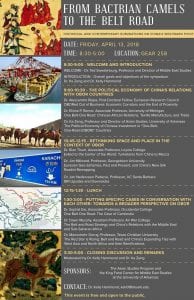Asian Studies Hosts One-Day Symposium, ‘From Bactrian Camels to the Belt Road,’ April 13
 The Asian Studies Program in the J. William Fulbright College of Arts and Sciences, in collaboration with the King Fahd Center for Middle East Studies, will host a one-day symposium entitled “From Bactrian Camels to the Belt Road—Historical and Contemporary Ruminations on China’s Westward Pivot” from 8:30 a.m. to 5 p.m. Friday, April 13 in Gearhart Hall, room 258.
The Asian Studies Program in the J. William Fulbright College of Arts and Sciences, in collaboration with the King Fahd Center for Middle East Studies, will host a one-day symposium entitled “From Bactrian Camels to the Belt Road—Historical and Contemporary Ruminations on China’s Westward Pivot” from 8:30 a.m. to 5 p.m. Friday, April 13 in Gearhart Hall, room 258.
The symposium is free and open to the public, lunch will be provided and drop-ins are welcome.
In recent years, the “One Belt, One Road” (OBOR) strategy has emerged as a centerpiece of both Chinese foreign policy and Chinese domestic economic strategy. As the initiative is likely to have a profound impact on the regional economic architecture and China’s relations with other major powers in the region and beyond, it is imperative for the scholarly community to reflect on the political, social and economic dimensions of China’s relations with OBOR countries so as to better understand the opportunities and challenges that the Chinese nation states are likely to face in their renewed engagement with the West.
This interdisciplinary symposium examines the transformation of China’s relations with its partners in the Middle East, Central Asia, Southeast Asia and Africa from the early modern Silk Roads to the current era of OBOR.
By bringing together scholars from diverse backgrounds and connecting them from both historical and contemporary perspectives, the symposium aims to advance our understanding of China’s complex interactions with its African and Eurasian partners.
This story originally appeared in the University of Arkansas’ Newswire publication. Please visit news.uark.edu for more stories like this.
Ka Zeng
Director of the Asian Studies Program, J. William Fulbright College of Arts and Sciences
479-575-3356 // kzeng@uark.edu

